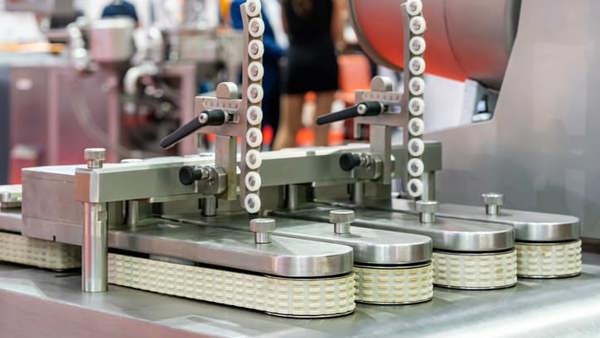
There are a wide variety of rubber and plastic materials available, but not all of them are made with food safety in mind. The FDA sets strict regulations for any parts used in the food processing industry and any other markets where applications can potentially contaminate consumable goods. In general, FDA compliant materials must be:
- Tasteless
- Odorless
- Resistant to bacteria
- Compatible and safe to use with different types of food, beverages, and food compliant chemicals
- Able to operate at an appropriate temperatures range for food products
- Non-toxic
- Non-marking
- Non-allergenic
6 Potential FDA-Compliant Rubber Materials
These characteristics immediately eliminate several materials, but there are still several options that can address food safety concerns and support the primary functions of your applications. Let’s break down some common rubber materials (and one performance plastic) that can be ideal fits for food-grade components.
Food-Safe EPDM
EPDM (Ethylene Propylene Diene Monomer) is a versatile rubber for several industries, food production included. EPDM is extremely durable and flexible, both in terms of elasticity and part fabrication. Its combination of performance characteristics makes EPDM a great option both for specialty parts and more general-purpose applications.
- Temperature Range: -60 to 350° F
- Additional Benefits:
- Excellent weathering capabilities.
- Stability in high and low temperatures.
- Resistance to highly acidic substances and corrosive materials.
- Steam and water resistant.
Food-Safe Silicone
Silicone is well-known for thriving in high-temperature environments, making it a potential option for food processing and other applications that require FDA compliance and heat resistance.
- Temperature Range: -150 to 480° F
- Additional Benefits:
- Resistance to a wide range of chemicals and solvents.
- Excellent weathering capabilities.
- Certain silicone compounds can withstand long-term, continuous use at around 400° F.
- Flame retardant with additives, with some grades of silicone receiving UL94 V-0 certification.
- Can be made clear or with different colors.
Food-Safe Neoprene
Neoprene is lauded for its oil resistance, which is great for food-grade applications where these parts may be intermittently exposed to oily and greasy substances. That characteristic combined with its physical durability makes neoprene a great option for applications ranging from food production to refrigeration seals.
- Temperature Range: -50 to 250° F
- Additional Benefits:
- Neoprene’s polymer structure can be modified to create a compound with a wide range of chemical and physical properties.
- Excellent resistance to twisting and flexing.
- Excellent weathering capabilities.
- High tensile strength and low compression set.
Food-Safe Nitrile
Nitrile (NBR) is one of the best rubber materials available when you need seals and other parts that demand oil resistance. Whereas neoprene is great for intermittent oil exposure, nitrile can withstand regular contact with greasy foods and other oily substances.
- Temperature Range: -40 to 250° F
- Additional Benefits:
- Excellent abrasion.
- Can stretch without losing shape and resist tearing.
- Resistance to water and gas permeability.
- Offers ample resistance to a variety of chemicals.
Food-Safe Viton
Viton, also known as fluoroelastomer, is a high-performance elastomer that can thrive in demanding environments. This material was originally used in the aerospace industry and boasts a combination of temperature and chemical resistance that pairs well for more challenging food-grade applications.
- Temperature Range: -10 to 600° F
- Additional Benefits:
- Excellent weathering capabilities.
- Good abrasion and tear resistance.
- Does not absorb water.
- Certain grades of Viton can perform in environments as cold as -40° F.
Food-Safe TPE
TPE (thermoplastic elastomers) is a material that can perform like rubber but is processed like plastic. Certain grades of TPE can be manufactured with UL and NSF approved ingredient options, allowing food-grade applications to benefit from this extremely flexible, elastic material.
- Temperature Range: -30 to 250° F
- Additional Benefits:
- Soft touch product that provides both slip resistance and shock absorption.
- Excellent chemical resistance.
- Excellent weathering capabilities.
- Can be scrapped and recycled.
Find the Right FDA-Approved Rubber and Plastic Materials for Your Parts
Investing in the right part solution can be tricky, which is why it’s good to have some help. Timco partners with businesses to supply businesses with tailored parts solutions based on their design specifications and budget. Give us a call at 800-969-6242 or contact us online to talk to one of our experts about parts for your applications.
